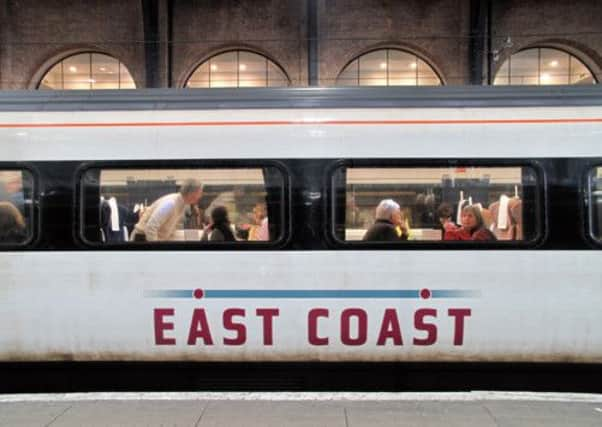£200m returned to the taxpayer as East Coast on the right track


Government-owned firm Directly Operated Railways (DOR) took over the running of the key London to Scotland via Yorkshire route four years ago after National Express lost the East Coast franchise.
In the year to March 31, York-based DOR reported a four per cent rise in turnover to £694m and returned £208.7m to taxpayers, up seven per cent on the previous year.
Advertisement
Hide AdAdvertisement
Hide AdThe company said the East Coast is Britain’s busiest train operator with over 225 customers per train, which is 36 per cent ahead of its rivals.
Passenger numbers rose by more than a million from 18 million to 19.1 million.
East Coast managing director Karen Boswell said: “I’m delighted with the customer satisfaction levels. We’ve listened to customers and what they want us to deliver.
“We are getting our people really engaged with the East Coast and making sure they understand they are really important to the company.
“This year the satisfaction levels are equally as strong.”
Advertisement
Hide AdAdvertisement
Hide AdShe added that by the time the line is handed back to private ownership in February 2015, the company will have returned £1bn to the Government.
Yet the state-backed company’s success has raised questions about the wisdom of returning the line to the private sector.
The Labour party and rail unions have questioned the need for re-privatisation, arguing that DOR is returning a high level of money to the Department of Transport and receives a lower taxpayer subsidy than others.
Last week it was announced that Channel Tunnel high-speed company Eurostar is bidding to operate the East Coast route jointly with French firm Keolis.
Advertisement
Hide AdAdvertisement
Hide AdThe successful bidder is expected to be announced in early 2015.
Bob Crow, general secretary of the Rail Maritime and Transport union, said: “These figures destroy from top to bottom this Government’s case for handing the East Coast back to the rip-off merchants from the private sector.
“DOR are paying even more money back to the Treasury, in contrast to the fat profits extracted from the privatised routes, and yet the politicians are prepared to completely ignore that.”
When asked if there is a danger that privatisation will damage the service, Ms Boswell said: “It’s difficult for me to comment on. I don’t view myself as a public sector worker or a private sector worker. It’s about leadership and running the business successfully.
Advertisement
Hide AdAdvertisement
Hide Ad“You have got to keep customers in mind at all times. When you lose that, it unravels.”
While the group has seen a reduction in cancellations and delays caused by train defects, Ms Boswell said that infrastructure issues with the track and overhead lines have made this one of the most challenging periods for the firm. During the spring and summer of 2012, the East Coast delivered the best punctuality on the line since records began, but this position reversed during the severe winter of 2012/13.
DOR said there were a greater number of “very significant infrastructure failures” over the winter and this has deteriorated over the past six months.
The group is in detailed conversations with Network Rail about how to remedy the issues.
Advertisement
Hide AdAdvertisement
Hide AdDOR said that more than 80 per cent of delays are a result of external factors, which are outside of the control of East Coast.
It added that nearly 70 per cent of them are directly attributable to infrastructure failures, which are the responsibility of Network Rail.
Network Rail has openly apologised to East Coast and its customers for the delays on the line, blaming a spate of infrastructure failures and engineering overruns.
The biggest delays occurred as a result of overhead wire failures, in three separate incidents.
Advertisement
Hide AdAdvertisement
Hide AdDOR said it is very concerned about this position and it is actively working with Network Rail to tackle the underlying causes of this sustained poor performance.
“Top of my wish list is a programme for a new overhead line project,” said Ms Boswell.
“I think we’re making a very strenuous case.”
The group said it has seen the highest level of staff engagement in the history of the East Coast franchise.
The most recent employee engagement levels came in at 71 per cent, up from 66 per cent the previous year and 62 per cent the year before that. Days off due to sickness have fallen from 14 days a year in 2009 to nine.